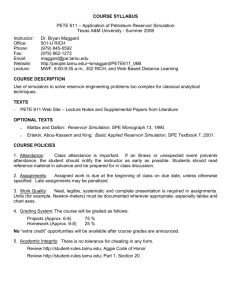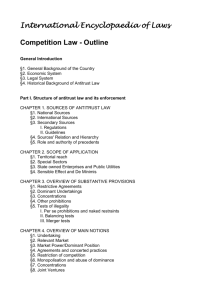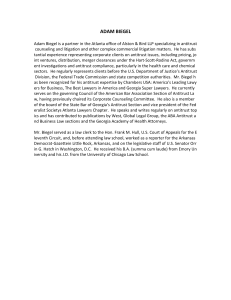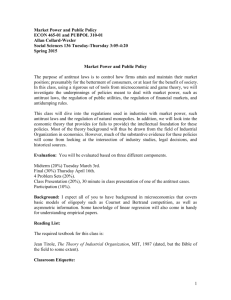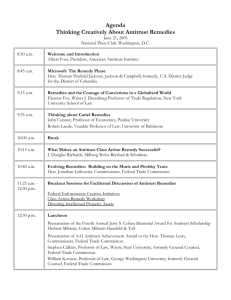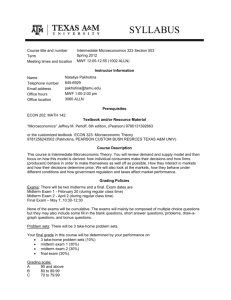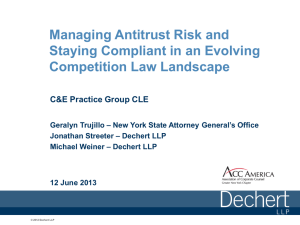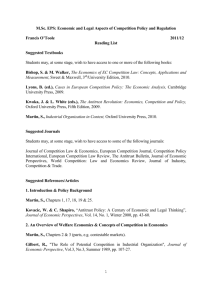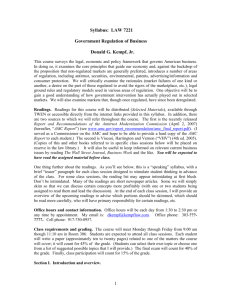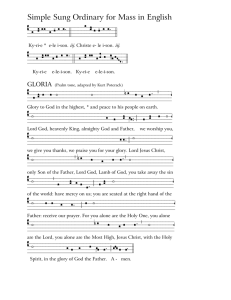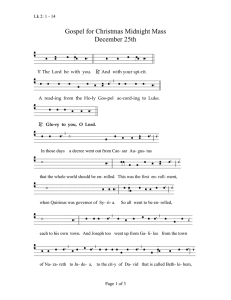Syllabus
advertisement
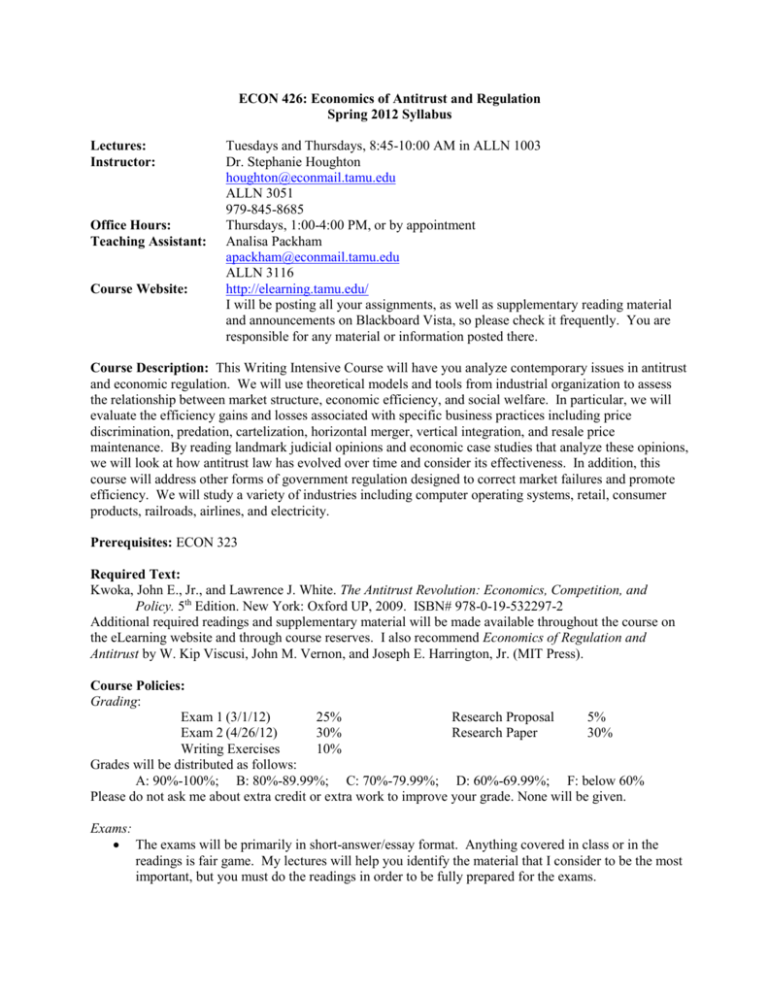
ECON 426: Economics of Antitrust and Regulation Spring 2012 Syllabus Lectures: Instructor: Office Hours: Teaching Assistant: Course Website: Tuesdays and Thursdays, 8:45-10:00 AM in ALLN 1003 Dr. Stephanie Houghton houghton@econmail.tamu.edu ALLN 3051 979-845-8685 Thursdays, 1:00-4:00 PM, or by appointment Analisa Packham apackham@econmail.tamu.edu ALLN 3116 http://elearning.tamu.edu/ I will be posting all your assignments, as well as supplementary reading material and announcements on Blackboard Vista, so please check it frequently. You are responsible for any material or information posted there. Course Description: This Writing Intensive Course will have you analyze contemporary issues in antitrust and economic regulation. We will use theoretical models and tools from industrial organization to assess the relationship between market structure, economic efficiency, and social welfare. In particular, we will evaluate the efficiency gains and losses associated with specific business practices including price discrimination, predation, cartelization, horizontal merger, vertical integration, and resale price maintenance. By reading landmark judicial opinions and economic case studies that analyze these opinions, we will look at how antitrust law has evolved over time and consider its effectiveness. In addition, this course will address other forms of government regulation designed to correct market failures and promote efficiency. We will study a variety of industries including computer operating systems, retail, consumer products, railroads, airlines, and electricity. Prerequisites: ECON 323 Required Text: Kwoka, John E., Jr., and Lawrence J. White. The Antitrust Revolution: Economics, Competition, and Policy. 5th Edition. New York: Oxford UP, 2009. ISBN# 978-0-19-532297-2 Additional required readings and supplementary material will be made available throughout the course on the eLearning website and through course reserves. I also recommend Economics of Regulation and Antitrust by W. Kip Viscusi, John M. Vernon, and Joseph E. Harrington, Jr. (MIT Press). Course Policies: Grading: Exam 1 (3/1/12) 25% Research Proposal 5% Exam 2 (4/26/12) 30% Research Paper 30% Writing Exercises 10% Grades will be distributed as follows: A: 90%-100%; B: 80%-89.99%; C: 70%-79.99%; D: 60%-69.99%; F: below 60% Please do not ask me about extra credit or extra work to improve your grade. None will be given. Exams: The exams will be primarily in short-answer/essay format. Anything covered in class or in the readings is fair game. My lectures will help you identify the material that I consider to be the most important, but you must do the readings in order to be fully prepared for the exams. If you know in advance that you have a conflict with one of the exam times, please see me as soon as possible so that we can work out an alternative. This may involve arranging to take the exam earlier or scheduling a modified make-up exam. No make-up exams will be given without a university-approved and documented excuse. Per Student Rule 7, you must notify me prior to the exam except in the case of an accident, emergency, or religious observance. If you are seeking an excused absence due to illness, you must notify me prior to the exam (email is fine) and provide confirmation of a visit to a health care professional. Non-excused absences will result in a zero for that portion of your grade. If you think there has been a mistake in the grading of your exam, please contact me no later than one week after the exam was returned. I reserve the right to re-grade the whole work, meaning that you may lose points (since mistakes can happen in both directions). Research Paper: In order to fulfill the requirements for this Writing-Intensive Course, you will be asked to analyze and evaluate a recent antitrust case, merger, or policy issue. The final product of the analysis will be an 8-12 page paper (2000 word minimum). Writing is a continuous process that requires time and dedication. For this reason, you will be required to present your work in several stages: first, a 1-page proposal, followed by two rounds of rough drafts before turning in the final work. I will provide more details on the requirements for each of these assignments in a separate handout, but for now, please be aware of these key dates: o Thursday, February 23, 2012: Proposal Due o Thursday, March 22, 2012: First Rough Draft/Outline Due o Thursday, April 5, 2012: Second Rough Draft Due o Tuesday, May 1, 2012: Final Paper Due by 5pm (no class meeting) Assignments are due at the beginning of class on the above date. Penalties will be assessed on your final research paper grade for each day any of these assignments are turned in late. There are many resources available to assist you in developing your writing skills. Class time will be devoted to writing instruction and peer review. I also encourage you to consult with me or your TA, Analisa Packham, during office hours and to take advantage of the wealth of services offered by the University Writing Center. Writing Exercises: Announced and unannounced writing exercises will be given periodically. These exercises will involve writing practice based on the assigned reading or group work (e.g., a peer-review session to comment on drafts of the research paper). Your lowest score from these exercises will be dropped before averaging. I will not accept late work. If an exercise is given during the first 5 minutes of class, and you are 5 minutes late to class, then you have missed that exercise. In order to make up the exercise, you must have a university-approved and documented excuse. Course Objectives and Expectations: This is an advanced, writing-intensive course in applied microeconomics. By the end of the course, you will have learned how to analyze competition within industry and to assess antitrust rulings and policies designed to regulate such competition. You will also have developed writing skills that are suited to the discipline of economics and that will serve you well in a number of potential careers, including economic consulting, academic research, law, policy analysis, or government service. To get the most out of each lecture, you are expected to do the readings in advance and will be called upon to discuss the facts of a case, identify the economic issues at hand, and offer your opinions on rulings and policies. This helps clarify your own thinking as well as contributes to the overall class’s learning experience. o I highly encourage classroom participation for several reasons. First, the class will be much more interesting for all of us if I am not the only person speaking for the entire class session. We will all benefit from hearing and thinking about different perspectives. Second, and perhaps more importantly, as your careers proceed, you will find it quite valuable to have the ability and courage to communicate verbally. Practice now. I will not enforce a formal attendance policy, though the best grades are historically earned by those who are active, engaged, and in class. If you miss a class, it is your responsibility to catch up with the material. If you cannot attend several lectures, it is a good idea to email or talk to me as soon as you can. As a courtesy to me and to your fellow students, please arrive on time and turn off your cell phones. If you absolutely must leave a class early, let me know in advance to minimize distractions. ADA Notice: The Americans with Disabilities Act (ADA) is a federal anti-discrimination statute that provides comprehensive civil rights protection for persons with disabilities. Among other things, this legislation requires that all students with disabilities be guaranteed a learning environment that provides for reasonable accommodation of their disabilities. If you believe you have a disability requiring an accommodation, please contact the Department of Student Services, Services for Students with Disabilities, in Cain Hall, or call 845-1637. Copyright Notice: The handouts used in this course are copyrighted. By “handout” I mean all materials generated for this class, which include but are not limited to syllabi, quizzes, exams, in-class materials, and review sheets. You do not have the right to copy or distribute these materials, unless I expressly grant permission. Statement on Academic Integrity: The Aggie Honor Code states An Aggie does not lie, cheat, or steal, or tolerate those who do. Upon accepting admission to Texas A&M University, a student immediately assumes a commitment to uphold the Honor Code, to accept responsibility for learning, and to follow the philosophy and rules of the Honor System. Students will be required to state their commitment on examinations, research papers, and other academic work. Ignorance of the rules does not exclude any member of the TAMU community from the requirements or the processes of the Honor System. For additional information please visit www.tamu.edu/aggiehonor/ Because this is a Writing-Intensive Course, the problem of plagiarism is of special concern. It is against university rules and will not be tolerated. The failure to properly credit sources or the use of a paper written by someone else may result in a failing grade for the assignment, the course, and/or referral to the Aggie Honor System Office. If you have questions as to what constitutes plagiarism, please consult me, the University Writing Center, or the AHSO Aggie Honor System Office website (www.tamu.edu/aggiehonor/). I also recommend this tutorial on the library’s website. Course Outline Note: The following is a tentative schedule of the topics the course aims to cover. I will update the schedule on the course website with specific readings and dates as the class goes on. If there is a topic you are especially interested in, please let me know and I’ll try to incorporate it or spend extra time there. Week 1 Date 1/17 1/19 2 1/24 1/26 3 4 5 6 7 1/31 2/2 2/7 2/9 2/14 2/16 2/21 2/23 2/28 3/1 8 3/6 3/8 9 10 3/20 3/22 3/27 3/29 11 12 13 14 4/3 4/5 4/10 4/12 4/17 4/19 4/24 4/26 5/1 Topic I. Introduction to Antitrust and Regulation When Markets Work (Walters, Ch. 2) When Markets Don’t Work (Walters, Ch. 3) II. Background on Antitrust Policy Legal Statutes Early Cases, Per Se v. Rule of Reason (Excerpt from Key Cases) III. Horizontal Practices and Horizontal Mergers Theoretical Models of Oligopoly (VHV Ch. 5) Price-fixing, bid rigging, and market division (Excerpts from Key Cases) Price-fixing, bid rigging, and market division (KW Case 11: Lysine Cartel) Price-fixing, bid rigging, and market division (KW Case 12: Ohio Milk Markets) Tacit collusion and “facilitating practices” (KW Companion: The Airline Tariff Publishing Case) Horizontal Mergers: Guidelines (Commentary written by the FTC and DOJ) Horizontal Mergers: Cases (Excerpts from Key Cases, KW Case 7: Staples-Office Depot) Horizontal Mergers: Cases (KW Case 6: Heinz-Beech Nut) Research Proposal Due Review/Catch-up EXAM 1 IV. Vertical Mergers and Vertical Restrictions Vertical Integration: Meet in Economic Research Laboratory Vertical Integration: Theoretical Background (VHV Ch. 8), Cases Spring Break – March 12-16 Vertical Integration: Cases Resale Price Maintenance, Territorial Restraints (KW Case 17: State Oil v. Khan) 1st Draft Due Exclusive Dealing (VHV Ch. 8, KW Case 14: Dentsply, KW Case 16: ToysRUS ) Tying and Bundling (VHV Ch. 8, KW Case 13: Trident, KW Companion: Jefferson Parish) VII. Monopolization and Network Issues Legal Treatment of Monopolization (Excerpts from Key Cases) In-Class Peer Review 2nd Draft Due Networks (KW pp. 474-486 and “Economics of Standards Wars” by Stango) The U.S. v. Microsoft Case (KW Case 20) Predatory Pricing (KW Case 8: Spirit v. Northwest Airlines) VIII. Regulated and Deregulated Industries Airlines (“How Airline Markets Work…or Do They?” chapter by Borenstein and Rose) EXAM 2 No class meeting. Final Paper Due by 5pm ** Sample readings are listed in parentheses. For daily reading assignments, check schedule on eLearning!

